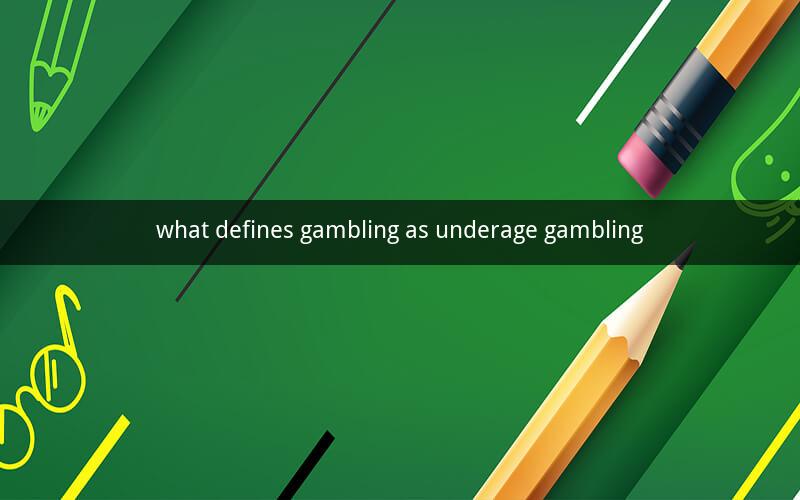
Contents
1. Definition of Underage Gambling
2. Legal Age for Gambling
3. Risks and Consequences of Underage Gambling
4. Identification of Underage Gamblers
5. Prevention and Intervention Strategies
6. Parental and Guardian Involvement
7. Educational Programs on Responsible Gambling
8. The Role of Technology in Preventing Underage Gambling
9. International Perspectives on Underage Gambling
10. Future Trends and Challenges
---
1. Definition of Underage Gambling
Gambling, as defined by the Gambling Act 2005 in the United Kingdom, is the process of betting on the outcome of an event or contest. Underage gambling refers to the act of gambling by individuals who are below the legal age of gambling set by the respective jurisdiction. This includes activities such as playing casino games, betting on sports, or engaging in online gambling.
2. Legal Age for Gambling
The legal age for gambling varies by country and even by state or region within a country. In the United States, for example, the legal age is typically 21, except for certain forms of lottery, which may be available to individuals aged 18 or 19. In the UK, the legal age for gambling is 18, except for gambling on horse racing, which is 16.
3. Risks and Consequences of Underage Gambling
Underage gambling can have severe consequences for individuals, their families, and society. The risks include:
- Financial problems: Underage gamblers may spend money they do not have, leading to debt and financial strain.
- Psychological issues: Problem gambling can lead to anxiety, depression, and other mental health problems.
- Social problems: Underage gambling can disrupt relationships with family and friends, and lead to social isolation.
- Legal issues: Underage gamblers may face legal repercussions for engaging in illegal gambling activities.
4. Identification of Underage Gamblers
Identifying underage gamblers is crucial for preventing underage gambling. Signs include:
- Unexplained financial difficulties.
- Changes in behavior, such as increased aggression or withdrawal from social activities.
- Signs of stress or anxiety.
- Evidence of illegal gambling activities, such as secret meetings or unusual online activity.
5. Prevention and Intervention Strategies
Several strategies can be employed to prevent and intervene in underage gambling:
- Age verification: Implementing age verification systems at gambling websites and venues can help ensure that only those of legal age are gambling.
- Education: Providing information on the risks of gambling to young people can help them make informed decisions.
- Parental involvement: Encouraging parents to monitor their children's online activities and to discuss the dangers of gambling can be effective.
- Professional help: For those who have already started gambling, seeking professional help can be a critical step toward recovery.
6. Parental and Guardian Involvement
Parents and guardians play a vital role in preventing underage gambling. They can:
- Set clear expectations about gambling and its risks.
- Monitor their children's online activities.
- Have open and honest conversations about gambling.
- Support their children in making healthy choices.
7. Educational Programs on Responsible Gambling
Educational programs can help young people understand the risks of gambling and make informed decisions. These programs may include:
- Workshops and lectures in schools.
- Online resources and materials.
- Parental and guardian education.
8. The Role of Technology in Preventing Underage Gambling
Technology can be both a tool for prevention and a potential risk factor. Measures to prevent underage gambling through technology include:
- Age verification software.
- Parental control tools.
- Age-restricted content filters.
9. International Perspectives on Underage Gambling
The issue of underage gambling is a global concern. Different countries have varying approaches to regulating and preventing underage gambling, including:
- Strict age verification requirements.
- Public awareness campaigns.
- Legal actions against underage gamblers.
10. Future Trends and Challenges
The future of underage gambling prevention and intervention will likely involve:
- Advances in technology to improve age verification and monitoring.
- Increased collaboration between governments, organizations, and parents.
- A greater emphasis on education and awareness.
---
Questions and Answers
1. Q: What is the legal age for gambling in the UK?
A: The legal age for gambling in the UK is 18, except for horse racing, which is 16.
2. Q: What are the risks associated with underage gambling?
A: Risks include financial problems, psychological issues, social problems, and legal issues.
3. Q: How can parents help prevent their children from gambling?
A: Parents can set clear expectations, monitor online activities, and have open conversations about the risks of gambling.
4. Q: What is the role of technology in preventing underage gambling?
A: Technology can help with age verification, parental control tools, and age-restricted content filters.
5. Q: How can schools contribute to preventing underage gambling?
A: Schools can provide educational programs and workshops to inform students about the risks of gambling.
6. Q: What are some signs that a young person may be engaging in underage gambling?
A: Signs include unexplained financial difficulties, changes in behavior, and signs of stress or anxiety.
7. Q: Can online gambling websites be held liable for allowing underage gambling?
A: Yes, online gambling websites can be held liable if they fail to implement effective age verification systems.
8. Q: How can governments regulate underage gambling?
A: Governments can enforce strict age verification requirements, conduct public awareness campaigns, and impose legal actions against underage gamblers.
9. Q: What is the most effective way to prevent underage gambling?
A: A combination of education, parental involvement, and strict legal enforcement is the most effective way to prevent underage gambling.
10. Q: How can young people protect themselves from the risks of gambling?
A: Young people can protect themselves by seeking information on the risks of gambling, setting personal boundaries, and seeking help if they feel they are developing a problem.